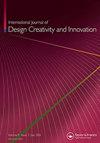Mapping associations: exploring divergent thinking through mind mapping
IF 2.5
Q4 ENGINEERING, MANUFACTURING
International Journal of Design Creativity and Innovation
Pub Date : 2019-04-03
DOI:10.1080/21650349.2018.1463178
引用次数: 16
Abstract
Abstract This study is a preliminary inquiry into the structure of mental associations as captured by the Mind Mapping process. Participants generated mind maps around a common central theme. The average frequency occurrence of items mentioned in the maps (i.e., responses) was used as a measure of the response’s relative ‘uniqueness.’ Although the creation of these mind maps was not framed as a Divergent Thinking task, interesting parallels to other Divergent Thinking tasks are reported and compared. This study expands upon the Serial Order Effect by utilizing the tree-graph structure of mind maps to parse out how the depth, breadth, and order of associations relates to uniqueness. The data shows a moderate relationship between order and uniqueness, and a strong relationship between depth and uniqueness. However, higher quantity of deeper responses does not indicate higher average uniqueness of responses. The results suggest that the latent dimensions of depth and breadth are not represented by ‘order’ and are absent in list formats. These results may inform more accurate Divergent Thinking assessments and better tools for aiding an idea generation processes.映射联想:通过思维导图探索发散思维
摘要本研究是对思维导图过程所捕捉到的心理联想结构的初步探索。参与者围绕一个共同的中心主题生成思维导图。地图中提到的项目(即响应)的平均出现频率被用来衡量响应的相对“唯一性”尽管这些思维导图的创建并没有被定义为发散思维任务,但与其他发散思维任务的有趣相似之处被报道并进行了比较。本研究利用思维导图的树状图结构来分析关联的深度、广度和顺序如何与唯一性相关,从而扩展了序列顺序效应。数据显示,秩序与唯一性之间存在适度关系,深度与唯一性间存在强烈关系。然而,较深响应的数量越高并不意味着响应的平均唯一性越高。结果表明,深度和广度的潜在维度没有用“顺序”来表示,并且在列表格式中不存在。这些结果可能会为更准确的发散思维评估和更好的工具提供信息,以帮助形成想法。
本文章由计算机程序翻译,如有差异,请以英文原文为准。
求助全文
约1分钟内获得全文
求助全文
来源期刊

International Journal of Design Creativity and Innovation
ENGINEERING, MANUFACTURING-
CiteScore
3.80
自引率
27.80%
发文量
15
期刊介绍:
The International Journal of Design Creativity and Innovation is an international publication that provides a forum for discussing the nature and potential of creativity and innovation in design from both theoretical and practical perspectives. Design creativity and innovation is truly an interdisciplinary academic research field that will interest and stimulate researchers of engineering design, industrial design, architecture, art, and similar areas. The journal aims to not only promote existing research disciplines but also pioneer a new one that lies in the intermediate area between the domains of systems engineering, information technology, computer science, social science, artificial intelligence, cognitive science, psychology, philosophy, linguistics, and related fields. The journal covers, but is not restricted to, the following topics: ·Theories on Design Creativity and Innovation ·Cognition of Design Creativity ·Innovative Process ·Inventive Process ·Analogical Reasoning for Design Creativity and Innovation ·Design Synthesis ·Method and Tools for Design Creativity and Innovation ·Representation of Design Creativity and Innovation ·Education for Design Creativity and Innovation ·Concept Generation and Inspiration.
 求助内容:
求助内容: 应助结果提醒方式:
应助结果提醒方式:


